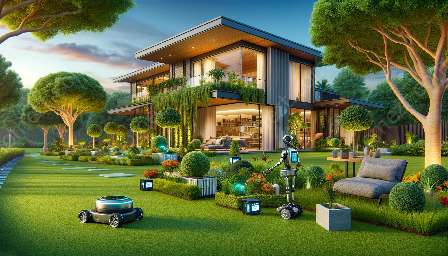Introduction
As technology continues to advance, it has made its way into every aspect of our lives, including our gardens. Intelligent home gardening involves the use of automated garden and landscape solutions and integrates with the overall design of a smart home. However, with these advancements come important considerations related to privacy and security. This topic cluster explores the implications of integrating smart technology into home gardening and provides insights into maintaining the privacy and security of your data.
Privacy Considerations
Intelligent home gardening relies on the collection and storage of data from various sensors, devices, and systems. This data may include personal information, such as gardening preferences, schedules, and even location details. As a result, ensuring the privacy of this data is paramount. Homeowners must consider the following privacy factors when implementing automated garden and landscape solutions:
- The collection and storage of personal data
- Data access and sharing permissions
- Protection against unauthorized access
By addressing these factors, homeowners can maintain the privacy of their gardening-related information and data.
Security Considerations
In addition to privacy concerns, security is another critical aspect of intelligent home gardening. With the integration of smart technology, there is an increased risk of security breaches and data vulnerabilities. Homeowners should prioritize the following security considerations:
- Secure communication protocols for connected devices
- Implementation of encryption and authentication measures
- Regular software updates and maintenance
By incorporating robust security measures, homeowners can mitigate the risk of unauthorized access, data breaches, and potential cyber threats in their intelligent home gardening systems.
Compatibility with Automated Garden and Landscape Solutions
Automated garden and landscape solutions encompass a wide range of technologies, from smart irrigation systems to weather monitoring devices. Integrating these solutions into intelligent home gardening requires careful consideration of compatibility to ensure a seamless and efficient system. When evaluating compatibility, homeowners should focus on:
- Integration with existing smart home systems
- Interoperability of different devices and technologies
- Data synchronization and management
By prioritizing compatibility, homeowners can leverage the full potential of automated garden and landscape solutions within their intelligent home gardening setup.
Intelligent Home Design
Intelligent home design encompasses the overall layout and infrastructure of a smart home, including the integration of various connected devices and systems. When incorporating intelligent home gardening, homeowners should consider:
- Seamless integration of gardening and home automation systems
- Optimal placement of sensors and monitoring devices
- User-friendly interfaces for gardening control and monitoring
By aligning intelligent home gardening with the broader design of the smart home, homeowners can create a cohesive and efficient living environment.
Conclusion
Intelligent home gardening offers an innovative and convenient approach to managing outdoor spaces. However, to fully benefit from this technology, homeowners must prioritize privacy and security considerations, ensuring the protection of their data and systems. By understanding the compatibility with automated garden and landscape solutions and integrating intelligent home gardening within the broader home design, homeowners can create a harmonious and secure environment that enhances their gardening experience.


